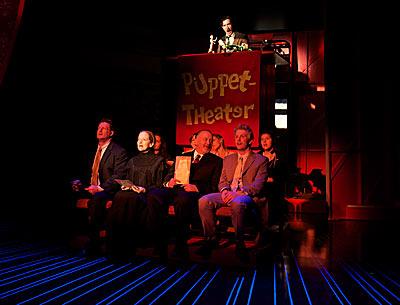Art, Life, and Striptease

“Travesties” by Sir Tom Stoppard opened Saturday as the second production in Bay Street’s season of — as Scott Schwartz, the artistic director, puts it — “art and revolution.” If one were to Google the words “plays about art and revolution,” this provocative and brilliant offering by the Isaac Newton of theater would most likely be first, or at least in the top 10.
The evening follows the tangential thoughts of Henry Carr, veteran of the Great War, as he semi-recalls his time in Zurich with the author James Joyce, Tristan Tzara, Dadaist innovator, and “Comrade” Vladimir Lenin, founder of the Russian Revolution.
“Travesties” includes references to Joyce’s 1917 production of Oscar Wilde’s “The Importance of Being Earnest,” which was indeed performed by the English Players in Switzerland, and did indeed include a Henry Carr in its cast. That’s all the indeeds you’ll be getting, because it doesn’t really matter whether any of it happened or not, since Sir Tom, through the senile Mr. Carr, mixes fact, fiction, poetry, dance, magic, music, revolution, and striptease into an evening of layered social and artistic meaning and humor.
The fourth wall is broken during the first five minutes, the fifth wall by the end of Act One, and other walls are built and broken as the evening progresses. There is a scene performed entirely in limerick, another only using quotes from Shakespeare, and life imitates art imitates life, as Mr. Carr continues to confuse events from 1917 with scenes from Oscar Wilde’s breezy comedy.
Once again, it’s not particularly important to know or notice these references. If you “get it,” you will have the opportunity to feel wicked smart; if not, “Travesties” is still an astonishing play about artistic and social revolution. And there’s boobies.
Who cares if one is familiar with the parody of one of vaudeville’s greatest two-man songs, “Mr. Gallagher and Mr. Shean,” when it is performed by two gorgeous women in lingerie and degenerates into an erotic pie fight? Or with the satire of the saloonkeeper Martin J. Dooley, a columnist for The Chicago Post (really the alter ego of Finley Peter Dunne, a journalist, and a thorn in James Joyce’s side), when it leads to another musical number by the cast and crew?
Richard Kind, a Bay Street trustee and perennial Sag Harbor board-treader, takes on the role of Mr. Carr, a British consul with a failing memory and a fetish for sartorial splendor, with electricity and passion, while still managing to wear the part like a comfortable pair of trousers — he talks to the audience up close and personal and clearly feels at home on Bay Street’s stage. The part of Henry Carr is one of extraordinary verbiage — some monologues are delivered rat-a-tat-tat — and it is Mr. Kind’s good fortune to play a character with a pleasant form of dementia, since the occasional line flub can be placed in the aging hands belonging to Mr. Carr, not Mr. Kind.
The director, Gregory Boyd, is another star in an evening full of them. As artistic director of Houston’s Alley Theatre, Mr. Boyd is clearly a lover of all things Stoppard (he has directed “Travesties” before, including a production at the Long Wharf in New Haven) and manages to separate the ridiculous from the sublime with sound effects, lighting, and scenic changes. It is crucial to this play (as it is to “The Real Thing,” another of Sir Tom’s brilliant sojourns into the fantasy-reality continuum) that actions and words and scene changes move at a fast and ferocious pace, and Mr. Boyd and his costume, set, and lighting team deserve major props for accomplishing the almost impossible.
Michael Benz portrays Tristan Tzara and Earnest with a necessary dose of silliness and appropriate arrogance in a dynamic turn. Carson Elrod, who takes on the role of James Joyce, delivers a plucky Irish performance, skating between erudition and buffoonery. The multitalented Andrew Weems plays Lenin flawlessly, capturing both his incendiary leadership and his passion for the classical — a revolutionary when it comes to politics but not to art. Aloysius Gigl — no, not one of Joyce’s characters, but an actor in this production — also offers a multilayered performance as Bennett, Mr. Carr’s manservant.
The cast of women is led by Isabelle Keating as Lenin’s wife, Nadya, an outstanding performance by an actress of fortitude and fervor. Emily Trask and Julia Motyka have a chance to shine their own beacons as they play librarians and lovers. There is more to tell, but unlike Joyce’s ponderous tome “Ulysses,” newspaper space is at a premium.
The question is: Will it play in Peoria? Sag Harbor in the summertime is inhabited less and less by the artistic and revolutionary, more and more by the tanned and the shellacked. An audience member on the opening night of “Travesties” was heard to mutter to her mate, “What’s a theater patron?” — pronouncing the latter word as if it were a brand of tequila.
That is of no consequence to the cast and crew of “Travesties,” who deserve a rousing “Hoopsa boyaboy hoopsa.”
